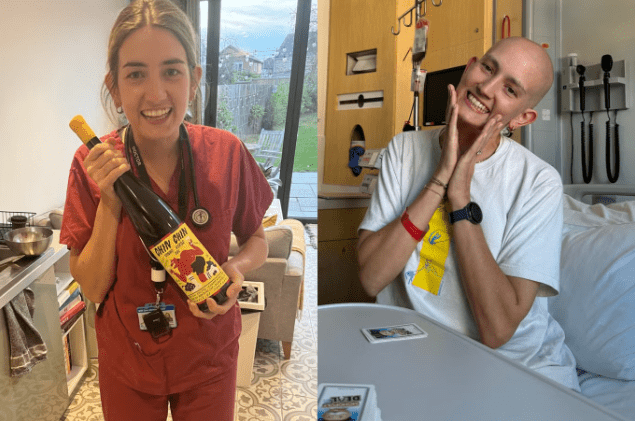It was an ordinary shift in A&E for 28-year-old Alice Bolton when her world was turned upside down. The young doctor, who splits her time between Surrey and London, had only just undergone a routine blood test for what she believed to be glandular fever.
But within an hour, she received shocking news—delivered in the very hospital where she was working.
Alice had been training intensely for a half marathon just days earlier, running up to 20km at a time. But when she noticed swollen lymph nodes and bruising on her legs, she suspected a viral illness. The last thing she expected was to be diagnosed with acute myeloid leukaemia (AML), a rare and aggressive form of blood cancer.
Young Doctor Diagnosed with Acute Myeloid Leukaemia While Treating Patients
While working abroad in Melbourne, Australia, Alice found herself abruptly moved from the doctors’ area of the hospital to a patient’s bed.
“I was actually on shift, and they literally called me about an hour after I’d had the blood test, saying, ‘You need to go to A&E straightaway’. I said, ‘Oh, that’s weird, because I’m actually here anyway, I work in A&E’,” Alice said.
Initially expecting a consultant to send her home to recover from a virus, she was instead told to begin cancer treatment immediately.
“I was shocked, but the thing I was most concerned about was having to phone home and tell my sisters and my parents because I think that makes it more real,” she said.
Alice’s diagnosis on 16 May 2024 stunned her family. Her sisters Emma, 31, a biotech professional, and Kate, 29, a solicitor, were devastated by the news.
“You just never expect it from someone so young and healthy, especially because she was talking about all her running,” said Emma.
Kate added, “Being so far away from her was stressful and shocking, but we all rallied together as a family.”
Their parents and both sisters flew to Australia, supporting Alice as she underwent rounds of intensive chemotherapy. Side effects included hair loss, extreme fatigue and nausea, but her strength was a source of inspiration.
“It’s one of the hardest things you can go through, and she was seeing the light in every situation, which, as siblings, makes you feel extremely proud,” said Emma.
Following her treatment, Alice returned to the UK in June 2024 and was welcomed by friends and family in an emotional airport reunion. By October, she was in full remission—a moment she described as a “complete relief”.
She then began preparing to run the TCS London Marathon with her sisters. But in March 2025, a routine bone marrow test revealed a heartbreaking relapse. “It was cruel,” said Kate, reflecting on the devastating news.
Alice was informed that she would need a stem cell transplant. In a rare and fortunate twist, both Emma and Kate turned out to be perfect matches—an outcome with only a 6% probability according to Anthony Nolan.
“We have this deep sister bond and when they said, ‘You three are all a match’, it was really magical,” Kate said.
With her health situation rapidly changing, Alice and her partner Hayden, also a doctor, decided not to delay their wedding. Rather than postpone the ceremony originally planned for June, they tied the knot at Old Marylebone Town Hall on 15 March, with over 70 friends and family in attendance.
“On the day, and even the day before, the fact that Alice had relapsed didn’t come into my head once, I was just super excited to marry the love of my life,” Hayden said.
Now recovering from her latest round of chemotherapy, Alice is scheduled for a stem cell transplant in May, with Kate confirmed as the donor. The announcement was made extra memorable with a cake.
In support, Emma and Kate are preparing to run the London Marathon to raise funds for Leukaemia UK. Although Alice can’t run alongside them, she plans to cheer from the sidelines with a handmade sign that reads: “Run my stem cells, run!”
“Happiness can be found even in the darkest of times, if one only remembers to turn on the light. Having all of your friends and family around you and knowing that, especially now with medical research, things are constantly changing, (cancer) isn’t a death sentence,” she said, quoting Harry Potter’s Dumbledore.






